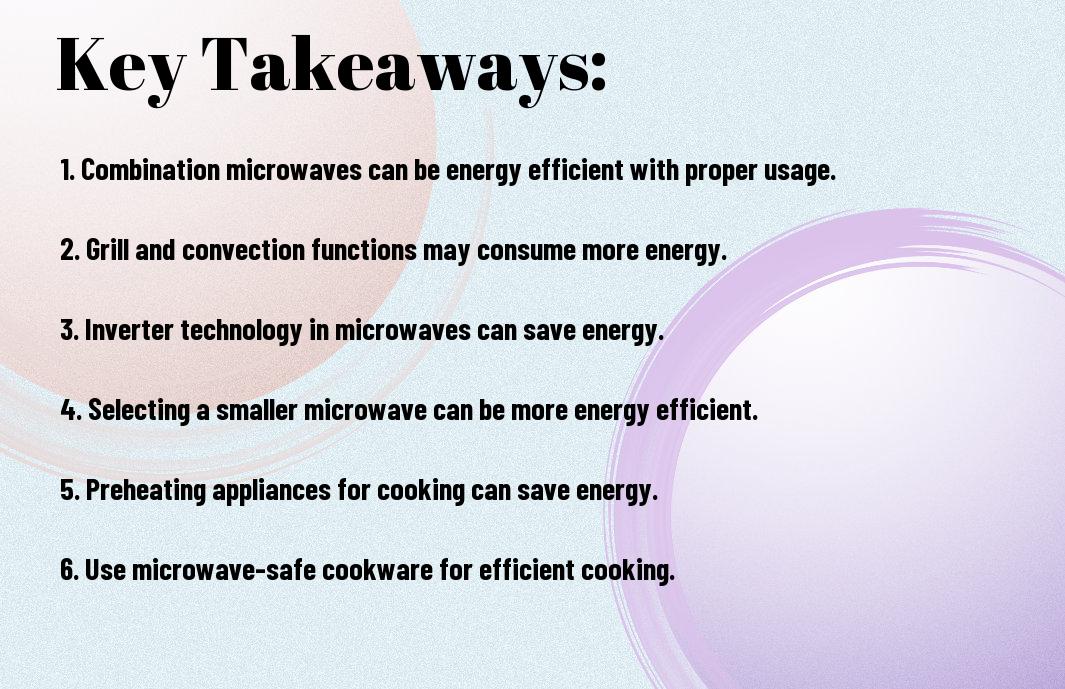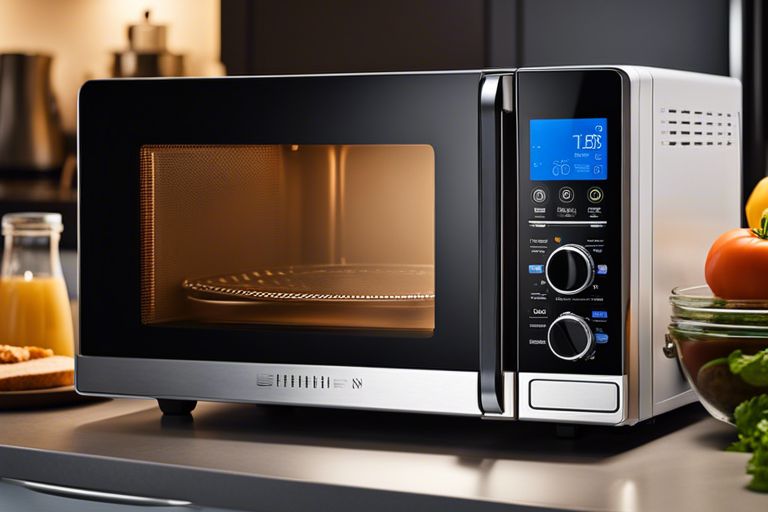Combination microwaves offer a versatile solution in the kitchen, but what about their energy efficiency? In this informative exploration, we probe into the world of combination microwaves to determine just how efficient they are when it comes to energy consumption. Join us as we uncover the facts behind these popular kitchen appliances and discover whether they truly live up to their reputation for energy efficiency.
Key Takeaways:
- Combination microwaves offer energy-efficient cooking options by combining microwave technology with convection or grill functions.
- Advancements in technology have improved the energy efficiency of combination microwaves, making them more environmentally friendly and cost-effective to use.
- Choosing an energy-efficient appliance like a combination microwave can help reduce energy consumption and lower utility bills in the long run.

Energy Efficiency Basics
What is Energy Efficiency?
The concept of energy efficiency refers to using less energy to provide the same service. It is about optimizing the energy output while minimizing wastage.
Importance of Energy Efficiency in Kitchen Appliances
Basics of energy efficiency in kitchen appliances can lead to significant cost savings on energy bills. Energy-efficient appliances consume less energy, reducing the environmental impact and promoting sustainable living.
Importance: Energy efficiency in kitchen appliances is crucial for reducing both energy consumption and costs. By opting for energy-efficient models, you not only save money in the long run but also contribute positively to the environment by reducing your carbon footprint.
How Combination Microwaves Work
Combining Microwave and Convection Cooking
Even though it may seem like an unlikely pairing, combination microwaves work by integrating microwave technology with convection cooking. The microwave function cooks food quickly and efficiently by agitating water molecules in the food, while the convection function circulates hot air around the food to create a crispy exterior.
Benefits of Combination Cooking
The combination of microwave and convection cooking in one appliance offers a host of benefits. Combination cooking allows for faster cooking times than traditional ovens, as the microwave function speeds up the process, while the convection feature ensures even cooking and browning. This results in delicious, evenly cooked meals in a fraction of the time.
Combination microwaves are also versatile, allowing you to use them as a standard microwave, a convection oven, or a combination of both, giving you the flexibility to cook a variety of dishes with ease.
Even for elaborate dishes that require both quick cooking and browning, combination microwaves provide a solution. By combining the speed of microwave cooking with the browning capabilities of convection cooking, these appliances can tackle a wide range of recipes efficiently.

Energy Efficiency of Combination Microwaves
Comparing Energy Consumption with Traditional Microwaves
Your wallet may thank you when opting for a combination microwave over a traditional one. Combining the functions of a microwave with convection and grilling capabilities, these appliances are designed to be energy efficient while offering versatility in cooking options.
| Combination Microwaves | Traditional Microwaves |
| Energy-efficient due to multifunctionality | Primarily for microwave cooking, less versatile |
| May consume slightly more energy in convection mode | Generally energy efficient for basic heating tasks |
Factors Affecting Energy Efficiency in Combination Microwaves
On the surface, combination microwaves may seem like energy hogs with their added features, but several factors come into play. The insulation quality, cooking duration, and frequency of door opening all play a role in determining the overall energy efficiency of these appliances. Recognizing these factors can help users make informed decisions when using their combination microwaves.
- Insulation quality affects heat retention and energy consumption
- Longer cooking durations may use more energy
- Frequent door opening can lead to heat loss and increased energy usage
This multifunctional appliance may consume more energy when using its additional features like convection or grilling. However, the energy savings from quicker cooking times and more efficient use of cooking modes can offset this increase. Recognizing the impact of different factors on energy consumption can help users optimize their usage and maximize energy efficiency.
Final Words
Upon reflecting on the efficiency of combination microwaves, it is clear that they offer a convenient and energy-efficient option for cooking. By combining microwave and convection cooking methods, these appliances save time and energy while still delivering excellent results. For those looking to streamline their kitchen appliances and reduce their energy consumption, a combination microwave could be a smart choice. Bear in mind, making informed decisions about the appliances we use can ultimately benefit both our wallets and the environment.
FAQ
Q: What is a combination microwave?
A: A combination microwave is a kitchen appliance that combines the functions of a traditional microwave with those of a convection oven.
Q: Are combination microwaves energy efficient?
A: Yes, combination microwaves are generally more energy efficient than traditional ovens, as they cook food faster and use less energy in the process.
Q: How do combination microwaves save energy?
A: Combination microwaves save energy by using a combination of microwave technology and convection heating to cook food quickly and efficiently.
Q: Are there any tips for maximizing the energy efficiency of a combination microwave?
A: To maximize the energy efficiency of a combination microwave, use the appropriate settings for the type of food you are cooking, and avoid overcooking or overheating your food.
Q: Are there any drawbacks to using a combination microwave in terms of energy efficiency?
A: While combination microwaves are generally energy efficient, they may use more energy than traditional microwaves when using the convection oven function. It’s important to use this feature wisely to ensure optimal energy efficiency.
